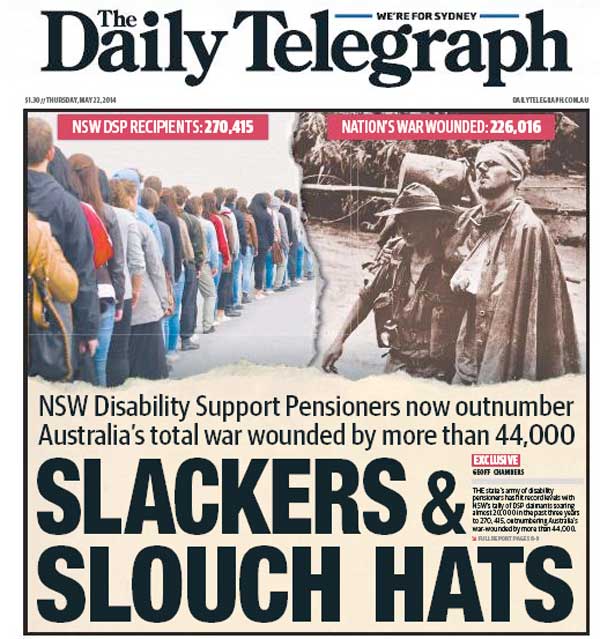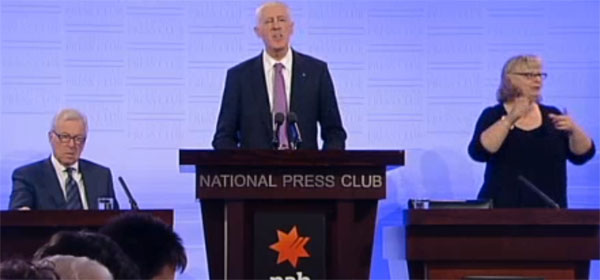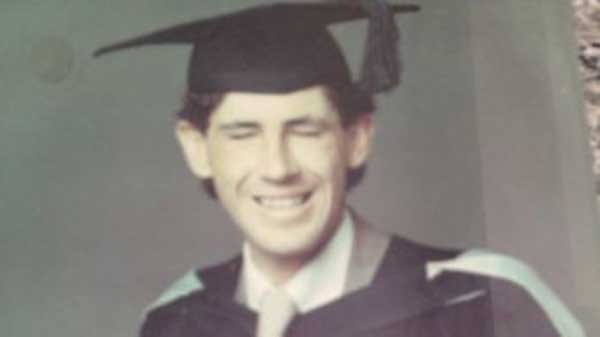Anybody who caught his address at the National Press Club on Wednesday will realise it’s been a big week for outgoing Disability Discrimination Commissioner Graeme Innes.
Towards the end of his remarks – which were at times deeply personal, but also sliced through Treasurer Joe Hockey’s division of society into “leaners” and “lifters” – Innes was on the verge of tears.
Today marks the end of almost nine years of service from Innes, who has held fast against Australia’s sometimes bitter political winds to oversee a period of significant reform to the nation’s treatment of people living with disabilities.
“I have mixed emotions,” he tells me over the phone. “I’m incredibly sad to leave this job because I’m so passionately committed to the rights of people with disabilities and it’s an area in which I’ve worked for a long time.
“But I think what is more upsetting for me than leaving – because everyone has to move on at some stage, and I’m probably at the point where I need to do different things – is the downgrading of the position and the impact that I know that will have on people with disabilities.”
The circumstances of Innes departure are ugly. Cuts to the Australian Human Rights Commission’s (AHRC) funding at the May budget mean Innes will not be replaced by a full-time disability discrimination commissioner, with age discrimination commissioner Susan Ryan taking over part-time.
Innes is legally blind and, though full of praise for Ryan, is dismayed a person without experience in the disability sector, nor with the experience of living with a disability, is taking over.
“It’s incredibly important to have a person with disability experience in the role,” says Innes.
“We would never accept having a man in the position of sex discrimination commissioner, because we know that women are the disadvantaged group.
“We would never accept having a white person as the Aboriginal and Torres Strait Islander social justice commissioner, and we should never accept having a person without lived experience of disability as the disability discrimination commissioner,” he says.
Innes’ departure also comes at the end of a particularly nasty period for those living with a disability in Australia.
In May, Sydney tabloid The Daily Telegraph ran a cover incongruously comparing the number of people claiming the disability support pension with the number of Australians injured in war.

The bizarre juxtaposition, complete with a stock image of a decidedly healthy queue of young adults to represent the “slackers” supposedly rorting the allowance, was a cruel and intentional misrepresentation of those who rely on the meagre disability pension to get by.
As Innes pointed out on ABC radio, the coverage wasn’t even original.
It was followed by the interim McClure report, which suggested the government move people off the more generous disability pension and onto Newstart (as the previous Labor Government infamously did to single parents).
The noises coming from Minister for Social Services Kevin Andrews make it seem likely that this transition will take place in the near future, a shift which could leave thousands of people with serious disabilities in financial difficulties.
While disability and welfare groups agree the difference between the rates of pensions and Newstart is an issue, they advocate increasing the latter rather than bumping people off the former.
But despite his deep concern about these attacks, budget opportunism and outright disregard for the community of people living with a disability, Innes is implacable.
He describes himself as a “glass half-full” kind of guy, and as our conversation goes on, it’s impossible to escape that conclusion.
Having mentioned US President Barack Obama as one of his heroes, I ask if he is concerned – as critics of American liberalism are – that apparent gains in civil rights and opportunities for disadvantaged or persecuted groups are illusory.
“No, we’re making progress,” he says. “We are going forward.
“Sometimes you get pushed back, you know. The downgrading of this position is a backward step for the sector, but the sector will come back.
“And as I said at the end of my speech on Wednesday, life – and quality of life – for people with disabilities is improving, and one day we will again have a full time disabilities discrimination commissioner with a lived experience of disability.
“I’m absolutely confident of that.”
At what seems like a tough moment for the disability movement, Innes’ confidence is arresting, but it doesn’t come across as naïve or disingenuous. These are simply the words of a person whose belief in progress has already helped it to be realised on many occasions.
Innes points to Australia’s ratification of the Convention on the Rights of People With Disabilities and subsequent development of the National Disability Strategy, the passage of the Disability Discrimination Act, production of the Twenty Years: Twenty Stories series, and commencement of the NDIS as the greatest reforms of the disability sector achieved in recent years.
They’re evidence of the legislative, legal, and policy progress that Innes says have made a real difference to the lives of average Australians.
In his National Press Club address, Innes pointed to several examples, including the story of man named Elliot.

Needing a wheelchair, Elliot had experienced problems getting to work, despite being well educated.
After a complaint to the AHRC and a conciliation process, his employer agreed to install an access ramp. As someone who benefited from the Liveable Housing Initiative, he was also able to live independently in his own home.
While Elliot still faces other challenges, none of these advances would have been possible without the years of advocacy and policy lobbying that came before them.
Innes notes that these changes have come about from a collective effort, but it is true he has played a significant personal role in many of them.
For every horror Telegraph headline that spins the news cycle and the commentariat into a frenzy for a day, thousands of stories like Elliot’s have silently played out during Innes’ time as commissioner.
“I have always used the telling of stories as a way to illustrate the impact of policy changes,” Innes says. “I think they’re such a lovely advocacy tool.”
And one of those stories is his very own.
For someone who is blind and working in the Sydney CBD, navigating through bustling city traffic and onto a peak hour train every day is a challenge. But the real problem starts once you (and in Innes’ case, your guide dog) have taken a seat.
Without access to the visual cues that litter stations and carriages there is no way to know where you are, save for the famously horse announcements made by conductors.
But 12-15 per cent of the time those announcements fail. To redress the situation, Innes began lodging complaints with the AHRC every time he caught a train on which the station announcements were inaudible or not made at all.
After conciliation failed, the matter ended up in court, with RailCorp (since superseded by Sydney Trains) arguing this was not discrimination.
On the day he travelled to court to hear RailCorp make that claim, Innes’s train failed to make any announcements.
Despite RailCorp’s obstinance, Innes won the case, and now blind and non-blind commuters alike can thank him for the greatly improved quality of audio on the trains that circle the harbour city.
Aside from the practical outcomes of a victory like this, it demonstrates the fact that Innes’ actions mimic his words, laying waste to the depiction of people with disabilities as helpless victims.
In an interview with Radio National earlier in the week, Innes drew a distinction between asking for assistance, something he is not afraid to do, and having his autonomy overruled.
“I do have a problem with – and I will challenge – people who make decisions for me, or about me,” he said.
He also denounced what Stella Young described as “inspiration porn” – when people are gratuitously lauded with compliments for performing mundane tasks like getting out of bed or going shopping.
“We don’t need congratulations for that,” he told Mitchell.
“If we do fantastically in wheel chair marathons, absolutely we need congratulations. If we climb Mount Kilimanjaro, as Nick Gleeson did, as a person who’s totally blind, or run up and down the empire state building, we do.”
But to falsely flatter otherwise is part of what Innes calls “the soft bigotry of low expectations”.
The battle with RailCorp was emblematic of Innes’ commitment to law and legal apparatuses to challenge discrimination (he is trained as a lawyer), but it also demonstrated that Innes is a strong media performer, a skill perhaps derived from his passion for debating as a schoolboy.
Innes remains a strong orator, and his Wednesday address even got some hearts pumping among the sometimes moribund members of the National Press Club. Reading the transcript is a stirring experience (you can, and should, do so here).
Innes also has a good head for politics, even if it’s not of the electoral or party kind. I ask if he ever got frustrated seeing the worst of politics – expediency triumphing over good policy, the targeting of the most vulnerable when savings must be made. Surely these things got him down?
“Of course, that is an inevitable result of working on the development and implementation of policy,” Innes says. “Because if you’re doing that and you have a vision for change that you’re working towards, that’s always going to come into conflict with politics, which is the art of the possible, and which is a far more pragmatic process.
“So over the years there have been many frustrations, and I’ve learned how you have to pick your battles and grasp your opportunities.
“Have the battles that you think you can win, or the battles which principle just demands you have anyway, and grasp an opportunity when it arises.
“That may be an opportunity that you’ve created but it equally may just be an opportunity that comes along.
“You have to be strategic enough to see those, and ride those waves.”

Having lived close to the fracas that is Australian politics for the past nine years, and witnessed so many policy sausages produced, it makes some sense that Innes includes a former Australian Prime Minister among his list of heroes (which also bears the names of Nelson Mandela and British slavery abolitionist William Wilberforce). He likes that Obama, Mandela, and Wilberforce all overcame frustration and adversity.
“Julia Gillard, for the same reasons,” he says, rounding off the list.
“She was the first woman Prime Minister and in an incredibly difficult and toxic political situation, she determinedly drove change in so many areas, and did it with a dignity and grace that many other politicians, on both sides of politics, haven’t been able to emulate.”
As the hours tick down on his final day at the AHRC, Innes has issued a new challenge to the current prime minister: more jobs for those living with disabilities.
It should start with the Commonwealth government arresting its falling rates of disability employment by imitating a US initiative and allowing MPs to take on an extra staffer – provided the person has a disability.
“That would firstly send an incredibly powerful signal to the public service that it needs to lift its shameful performance in terms of the employment of people with disabilities,” Innes says.
He argues it would also encourage private employers, and change community attitudes.
“It would also send a powerful signal to the disability sector, saying you are valued, and your contribution is being recognised.
“And it would send a powerful signal to the general population, because every time they went to speak to their local member they would see or come in contact with a person with a disability.”
Innes sees putting people with a disability at the heart of the process as key, but also emphasises the need to push business to take the initiative.
The second plank of his jobs plan is conferring with major employers then incentivising them to take on more workers with a disability, and to cut the “red-tape” that stops them from doing so.
After Innes leaves the commission, he will be pursuing a different reform front. No number of jobs will stop The Daily Telegraph rolling demonisation off the printing press – only a significant change in the way people with disabilities are seen by the public can do that.
And that’s why Innes has taken a leading roll at the new Attitude Foundation, which will strive to use television and film to change public attitudes towards people living with a disability.
In a country that indefinitely detains children who have committed no crime, watched over by a Prime Minister who treats scientists with disdain and locked women out of the highest halls of political power, it’s difficult to cling to the soaring narratives of social progress that optimists claim to find among the histories of great democracies.
But it’s optimists like Graeme Innes who, sometimes behind the scenes and sometimes in front of blaring camera lights, use their energy to propel our country in a better direction.
When the ranks of parliament fail to provide much hope for the progressive cause – I use the painfully broad term intentionally here – we must look outside of parliamentary politics for people to inspire, to lead, and to fight for a better future.
In that way, Innes’ advocacy and activism have reached far further than the hundreds of thousands who have already benefited directly from his work.
Graeme Innes has battled the tabloid press, provided countless media interviews, fought and beat one major corporation, taken on many others, sorted through thousands of complaints of discrimination and curated a period of great human rights progress.
He even managed to use a change.org petition to actually get something done.
Innes has run his marathon, so to speak, and now well and truly earned the widespread praise he has received.
It’s not inspiration porn, just well deserved respect.
Donate To New Matilda
New Matilda is a small, independent media outlet. We survive through reader contributions, and never losing a lawsuit. If you got something from this article, giving something back helps us to continue speaking truth to power. Every little bit counts.



